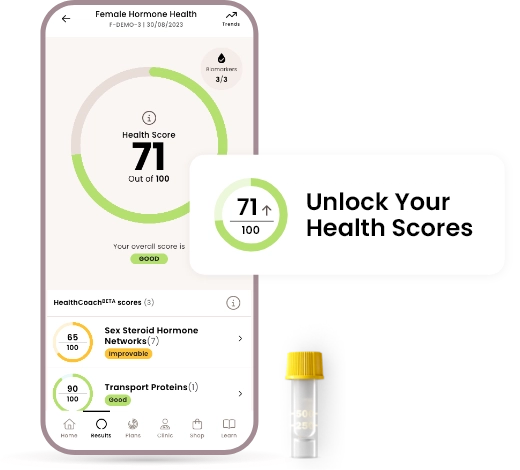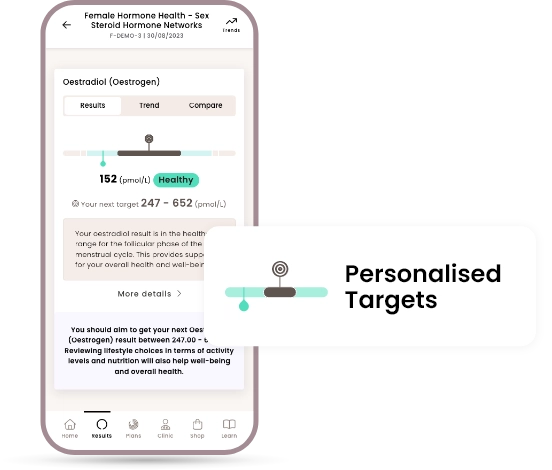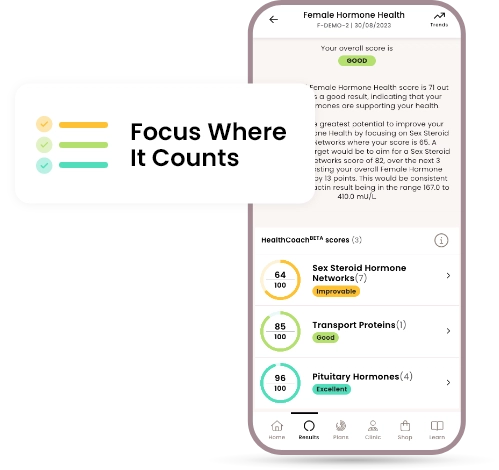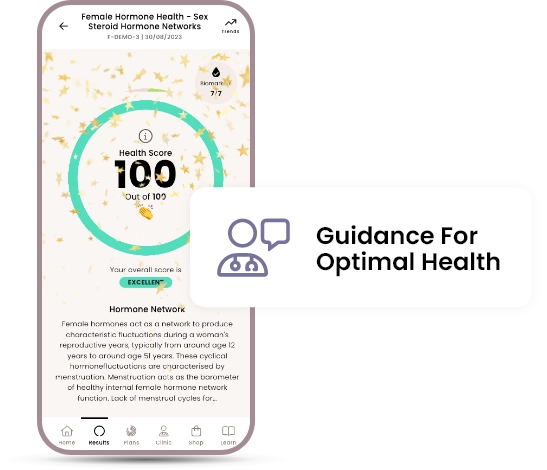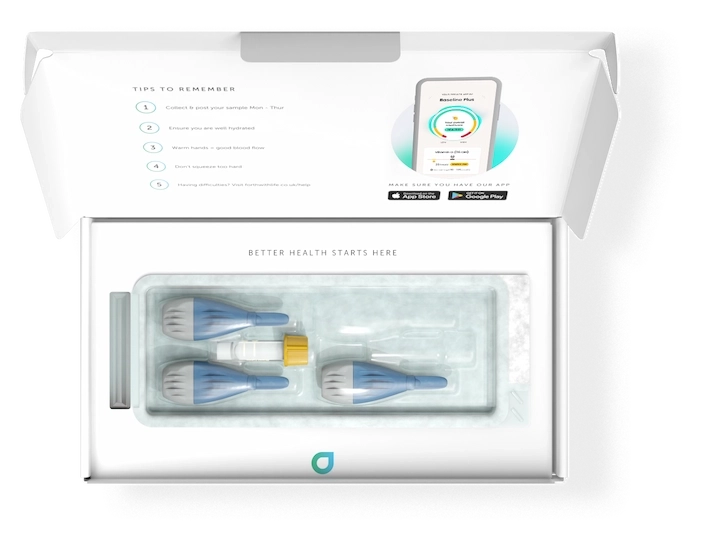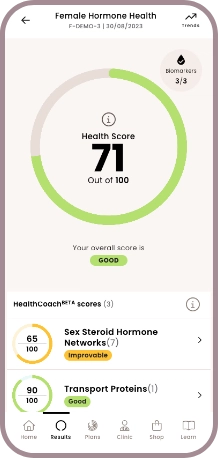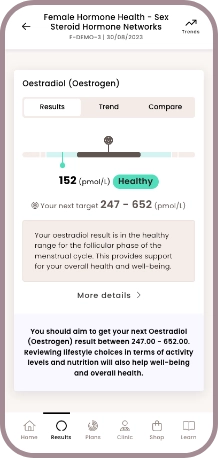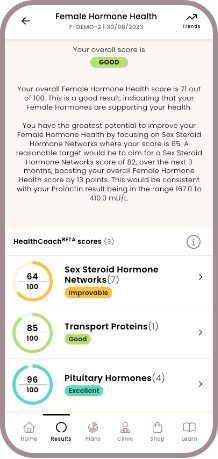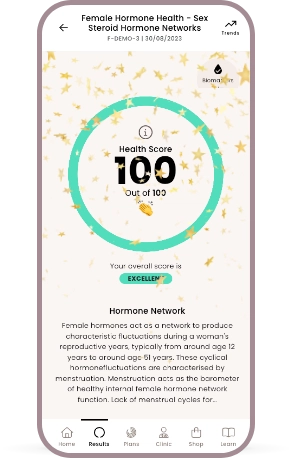About flexible subscriptions
How does a subscription work?
When you purchase this test subscription plan, we will automatically send you another test kit in a few months. Don't worry - you have full control over when this will be, and you can change/cancel it anytime.
When you first purchase this test, you can choose your subscription options in the checkout. We do this, because we recommend taking multiple tests over time to track how your biomarkers change. You'll be charged per test kit (rather than monthly, for example).
Why subscribe to multiple tests?
One test will show you what areas you need to focus on, continued testing will help you learn how your training, diet and lifestyle is impacting your health.
How often should I test?
We recommend a follow up test 3 months after your first test, followed by a test every 6 months depending on your results, but its up to you!
Can I change what's tested in future tests?
Yes, you can tailor/customise subsequent tests (via your app) to focus on just the areas that need improving.
Female Hormone Imbalance Blood Test
£89
Our hormone imbalance blood test for women checks 11 key biomarkers related to a hormone imbalance or thyroid problem which might be causing symptoms such as fatigue, weight gain, acne or irregular periods. It can also help you check if your hormone levels are affecting your fertility. The female hormone test can also help you check and monitor your hormone levels when using hormone replacement therapy (HRT).
Validated & analysed by NHS Lab
Tracked 24 delivery
Finger prick or venous collection
Results in 2 working days
3 Interest-free payments
Learn more
Shop now. Pay over time with Klarna
Klarna available at checkout.
Klarna's Pay in 3 / Pay in 30 days are unregulated credit agreements. Borrowing more than you can afford or paying late may negatively impact your financial status and ability to obtain credit. 18+, UK residents only. Subject to status. Ts&Cs and late fees apply.
What gets tested?
11 Biomarkers
Blood sample collection options
How does it work?
When do I take the test?
If you're having a regular period, collect your sample on day 3 of your menstrual cycle (day 1 being the first day of your period), otherwise take the test at any time. IMPORTANT: If you're using hormone gel or cream, please use the other hand for your blood sample to the one you use to apply the gel or cream to prevent contamination of the blood sample.
Certified for quality & security
Blood sample collection options
You can choose your preferred collection method when you checkout
Finger prick kit (FREE)
You can do this test at home without the need for a doctor. We'll send you everything you need to collect your sample and post it back to us. And it's all included in the cost. We've put together a video that covers the process, making it easy to check and track your health from home.
Home nurse appointment (+£60)
We'll arrange for a medical professional to visit your home and collect your sample. This is great if you're unsure on how it all works or have trouble collecting a sample. No need to book a doctor's appointment or visit a clinic, we'll send you everything you need to collect a sample and post it back to our labs.
Visit a partner clinic (+£45)
Once you've ordered your test, look out for an email from our phlebotomy partners containing information and a link to book your appointment. We'll send you everything the clinic will need to complete the sample and post it back to our labs.
Organise a nurse myself (FREE)
If none of the above options work for you, you can arrange your own medical professional to collect your sample. There is no additional charge for this. Once you've ordered your test, we'll send you everything you and your chosen medical professional will need to collect a sample and post it back to our labs.
Still unsure how it works? You can find more information on collection methods and the service we provide in our 'How it Works' section.
How does it work?

1. Choose your blood test
No need to wait for a GP appointment, your kit will arrive within 1-2 days, which includes everything you need to collect your blood sample and post it back to our labs.
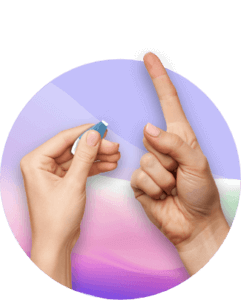
2. Collect your sample
Take your finger prick blood sample at home, or choose to have your blood taken at a Superdrug health clinic or a nurse at home. Return to our NHS lab using our prepaid envelope.
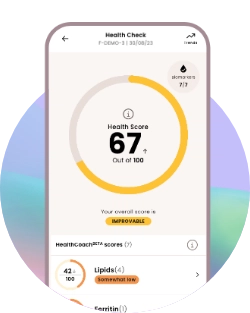
3. View your results
View your results on your secure health dashboard within 2 working days of our lab receiving your sample. Read personalised comments from our GPs.
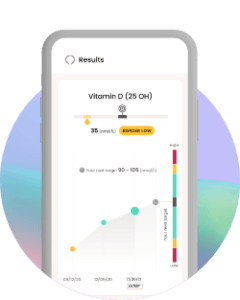
4. Make improvements
With more in-depth results, you will be able to identify areas that need improving. Make the changes and track your progress.
What gets tested?
11 Biomarkers Included
Additional biomarkers can be added by personalising this test.
What are biomarkers?
Biomarkers are specific compounds we can detect in your blood sample that reflect different things about your health. Your test will tell you your levels for each of the above biomarkers, and whether they are in a normal range.
Did you know?
31% of women experience severe reproductive health problems
PHE: Survey reveals women experience severe reproductive health issuesUnlock your health scores with HealthCoach™
Powered by cutting-edge technology, Forth’s industry leading app goes beyond reporting basic biomarker results and one-size-fits-all health advice to deliver a comprehensive roadmap to better health.
Your Female Hormone Imbalance Blood Test will give you the following Health Scores
Hormone health
Thyroid health
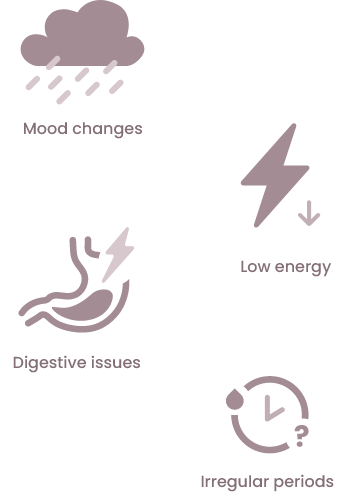
When should women check their hormone levels?
We recommend completing our female hormone blood test on day 3 of your menstrual cycle – if you’re having regular periods – or any time if you are not.
There are many stages of your life where testing your hormones can be helpful, such as if you’re trying to conceive, suspect you’re going through perimenopause or are experiencing symptoms related to a hormone imbalance. Our at-home hormone blood test means you can test and track your hormones whenever you need – without waiting to see your doctor.
What should normal female hormone levels be?
“Normal” levels will depend on several factors, such as your age. Women going through perimenopause or menopause will have very different levels compared to other women.
Your hormones also fluctuate across your menstrual cycle, so the normal range will change depending on what phase you’re in. The best way to find out if your levels are in the healthy range is to check them via a blood test.
Can this test detect perimenopause?
Our female hormone blood test checks your blood for a hormone imbalance and so can be used to screen for perimenopause. However, our Perimenopause Blood Test is a more useful test for detecting perimenopause, as it uses blood samples for day 14 and day 21 of your menstrual cycle, paired with AI to accurately map your hormone fluctuations.
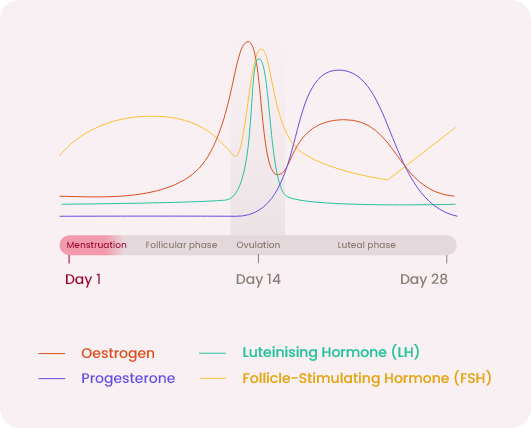
What is a full female hormone panel?
A full female hormone panel includes the 4 key female hormones – oestrogen, progesterone, follicle-stimulating hormone (FSH) and luteinising hormone (LH) – as well as testosterone and thyroid hormones such as TSH. Our female hormone test checks all of these and more, giving you a complete look at what’s going on inside to help detect conditions related to a hormone imbalance, such as PCOS, menopause, an under and overactive thyroid and fertility problems.
What are the signs of a hormonal imbalance in women?
A hormone imbalance in women can present itself in many ways – both physical and mental.
Increased levels of oestrogen can cause weight gain, heavier or lighter periods, fatigue (tiredness) and PMS, whilst low progesterone levels can cause irregular periods, headaches, fertility problems and hot flashes. Testosterone is also an important hormone to monitor. High testosterone in women can cause unwanted hair growth, acne and irregular periods. Low testosterone can also cause irregular periods, as well as low sex drive, loss of muscle mass and lack of energy.
These are just a handful of symptoms related to a hormone imbalance in women. There are many more and they can vary in severity from person to person. Checking your hormone levels via a blood test is the best way to find the answers you need.

Frequently asked questions
This is what our customers ask us most about this test. For more information, try our help centre.
What are female hormones?
The 4 main female hormones are progesterone, oestrogen, follicle-stimulating hormone (FSH) and luteinising hormone (LH). They play a wide role within the body affecting fertility, mood, energy and reproductive health.
They work together to regulate and manage your reproductive health. Testosterone is also important for women, as it’s used to produce oestrogen. These hormones naturally fluctuate during your menstrual cycle with levels of oestrogen and progesterone declining during perimenopause and menopause.
What causes a hormone imbalance?
The cause of hormone imbalance can be wide-ranging – from stress to thyroid disorders. So our female hormone test checks your key fertility hormones, along with thyroid function to help identify causes of your symptoms.
How do I test for a hormone imbalance?
Our female hormones blood test can help you test for and identify an imbalance in your hormones.
The test is a simple at-home, finger prick blood test. That means you only need to collect a small amount of blood from your fingertip, using the lancets included in the kit. You post it back to our labs, and we’ll send you the results within 2 working days after receiving it.
We’ll check the 4 key female hormones, as well as a range of other biomarkers related to a healthy hormone network.
How do hormones control the menstrual cycle?
The menstrual cycle is regulated by a complex interplay of hormones, primarily: oestrogen, progesterone, follicle-stimulating hormone (FSH), and luteinizing hormone (LH)
Follicular Phase
At the beginning of the menstrual cycle, called the follicular phase, FSH is released by the pituitary gland. It stimulates growth of follicles in the ovaries, each containing an immature egg (oocyte).
As the follicles grow, they start producing oestrogen. Rising levels of oestrogen stimulate the thickening of the womb lining (endometrium) in preparation for a potential pregnancy.
Ovulation
A sudden surge in LH levels, triggered by the high levels of oestrogen, starts around the middle of the menstrual cycle. This surge triggers the release of the matured egg from the ovary (ovulation).
Luteal Phase
Progesterone levels rise and peak during the luteal phase. It helps maintain the thickened womb lining, preparing it for possible implantation of a fertilised egg. If pregnancy doesn’t occur, progesterone levels drop.
Menstruation
The decrease in both oestrogen and progesterone levels triggers the shedding of the womb lining, marking the start of a new menstrual cycle.
This hormonal interplay is a delicately balanced process that typically spans about 28 days but can vary from person to person.
Does a hormone imbalance impact weight?
Hormone imbalances can impact various bodily functions, including metabolism, appetite, and fat distribution, which can have a knock-on effect on weight.
During menopause, when oestrogen levels decline, women may experience weight gain, particularly around the abdomen. Imbalances in progesterone levels can sometimes be associated with water retention and bloating, which might temporarily impact weight, although this is usually not a significant contributor to long-term weight changes.
How do I fix a hormone imbalance?
The first thing to consider is whether or not the imbalance needs ‘fixing’ or if it’s a natural fluctuation, such as during your menstrual cycle or during perimenopause.
There are treatments available to help manage the symptoms related to hormonal changes during perimenopause, such as HRT.
But you can also make lifestyle changes throughout your life to help manage the impact of hormone fluctuations. Your diet, how much you exercise and sleep, and whether or not you smoke/drink can all have an impact on your hormonal balance.
A blood test can help you keep track of your hormone levels, making it easier to monitor the impact of changes and live a healthy and happy life.
How soon will the test arrive?
If you order your test before midday on a Monday to Friday then your kit will be dispatched
the same day.
All our kits are sent out via Royal Mail first class post, so it should be with you within 1-2
working days.
How secure is my data?
We have strict processes in place to ensure the protection of your data. Following GDPR the company also operates under tight legal rules about the sharing of data which ensures that data is only shared if it is crucial to the delivery of our service. For example, our doctors see customer results at the time of review, however, after review, access to results is withdrawn.
Learn more about your data security.
Can I have someone take my blood for me?
Yes. We offer two options if you do not want to do our finger prick test. The first is a home appointment where a nurse comes to your home to take a blood sample. The second is to visit a Phlebotomy clinic near you that offers a blood sample service.
A blood sample will be taken from your vein and we will provide you with everything you need to give to the nurse to allow them to take the sample.
The nurse will give you the blood sample to return to us using the pre-paid envelope provided.
Does a doctor review my results?
We have a team of doctors and nurses who look at all results and will comment on any results that are outside of the normal range for your age.
Can I download the results to share with my GP?
Yes, you can download your results from your health dashboard as a PDF to share with your GP.
Learn how to export your results.
We are dedicated to supporting you on improving your health
Go to help center
Female Hormone Imbalance Blood Test, recommended by our doctors
"A Female Hormone Imbalance Test is vital for women's hormonal health. It assesses oestrogen, progesterone, and other hormone levels, helping diagnose issues like PCOS or menopause-related imbalances. This knowledge can help you manage symptoms, enhance fertility, and make informed decisions about your reproductive health and overall well-being, improving quality of life."
Dr Thom Phillips
Similar tests
- Health scores calculated
Close
We're changing people's lives
How our Female Hormone Imbalance Blood Test works
Getting the insights you need to improve your health has never been easier.

1. Choose your blood test
No need to wait for a GP appointment, your kit will arrive within 1-2 days, which includes everything you need to collect your blood sample and post it back to our labs.

2. Collect your sample
Take your finger prick blood sample at home, or choose to have your blood taken at one of our partner clinics or a nurse at home. Return to our NHS lab using our prepaid envelope.

3. View your results
View your results on your secure health dashboard within 2 working days of our lab receiving your sample. Read personalised comments from our GPs.

4. Make improvements
With more in-depth results, you will be able to identify areas that need improving. Make the changes and track your progress.
What's included in this test?
1x Yellow Tube
3x Lancets

1x Cleansing wipes

Plasters

2x Alcohol swabs
1x Return pouch

1x Tracked 24 return envelope

1x Lab request form
Blood sample kit
Results within 2 working days
Tracked 24 delivery & return
Secure health dashboard
Accredited lab analysis
Doctor reviewed results
Our impact in numbers...
70+
From hormones to nutrients, we offer 70+ different tests
60,000+
We've helped over 60,000 people improve their health
800,000+
We've delivered over 800,000 test results
Related articles
Like this article? Here are some more based on similar topics.
Female Hormone Imbalance Blood Test

